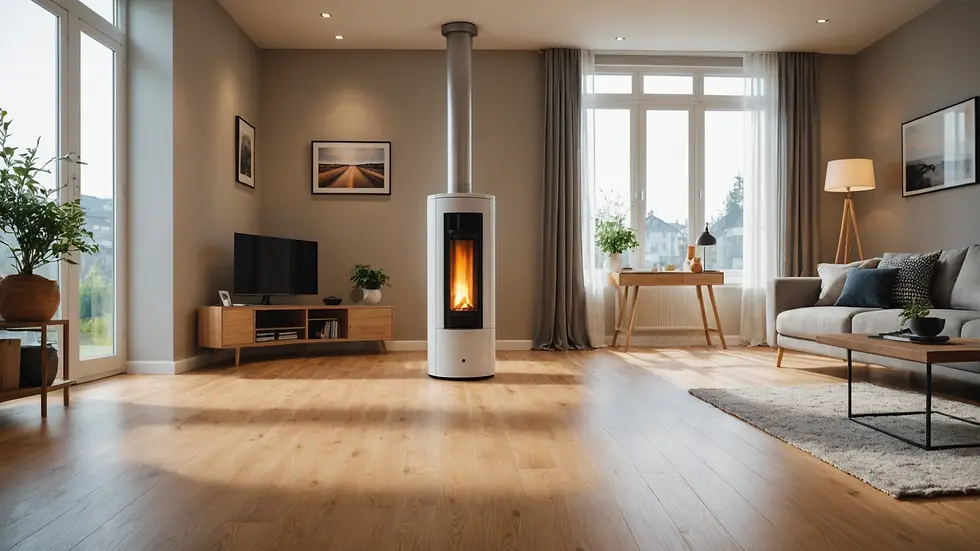Uncovering the Potential: The Role of Heat Pumps in Future Home Heating Post-2030
- office admin
- Feb 19, 2025
- 4 min read
The landscape of home heating is changing rapidly. With technology advancing and concerns about climate change increasing, homeowners are looking for better heating solutions. One standout option is the heat pump, which has the potential to transform residential heating after 2030. This post explores the many benefits of heat pumps, including their efficiency, environmental impact, and market trends.
What are Heat Pumps?
Heat pumps are innovative systems that transfer heat rather than generate it through combustion. They use small amounts of energy to move heat either from the ground, air, or water. For example, air-source heat pumps can extract heat from the outside air, even when it is cooler outside. This makes them a versatile and sustainable heating option compared to traditional heating systems that rely on fossil fuels.
As energy costs rise, homeowners are increasingly interested in heat pumps. Some studies indicate that heat pumps can be up to 300% more efficient than traditional heating methods, meaning they can provide three times more energy than they consume.
The Transition Towards Renewable Energy
The movement towards renewable energy sources is poised to dramatically influence home heating. Governments around the world are implementing stricter regulations to cut carbon emissions. This is pushing homeowners to explore greener alternatives.
Heat pumps' ability to use renewable energy sources is a significant advantage. For instance, ground-source heat pumps can tap into the Earth's heat, which is a sustainable approach. Research shows that using these systems can lower a home’s carbon footprint by up to 50%. As we look towards 2030, heat pumps are expected to become a core feature of eco-friendly homes.
Economic Considerations
The cost of transitioning to new technologies is always crucial. While the initial installation of heat pumps may be higher than that of conventional systems, they offer notable long-term savings on energy bills. For example, homeowners can save up to 40% on heating costs compared to traditional methods.
Government incentives can further ease the financial burden. Various countries offer tax credits or rebates for installing heat pumps. By 2030, as awareness grows and these incentives become more widespread, heat pumps are likely to become a more common choice for homeowners looking to invest in energy-efficient heating solutions.
Technological Advancements
Future heat pump systems will be shaped by ongoing technological advancements. Upgrades in compressor technology and smart thermostats will improve efficiency. For instance, smart home systems can optimize heating based on real-time weather forecasts and individual household needs.
Additionally, new research into refrigerants presents an exciting opportunity. By finding less harmful refrigerants, heat pumps will be even more environmentally friendly, appealing to homeowners concerned about climate impact.
The Role of Policy and Regulation
Government policies are crucial for the adoption of heat pump technology. Numerous countries are prioritizing energy-efficient solutions as part of their commitments to lower carbon emissions. For example, building codes and tax incentives aimed at encouraging energy-efficient home solutions are becoming more common.
Efforts to improve infrastructure, such as better electrical grids and access to geothermal energy, will support the growth of heat pumps. These developments will simplify the transition to cleaner heating methods.
Environmental Impact
The environmental advantages of heat pumps are significant. Studies indicate that when utilized properly, heat pumps can reduce greenhouse gas emissions by as much as 70% compared to traditional gas and oil heating. Their capability to integrate with district heating systems in urban areas can lead to collective emissions reductions.
In aggregate, as more households switch to heat pumps, we can expect a meaningful impact on overall carbon emissions. This shift is not just beneficial for individual homeowners but also for communities at large.
Consumer Awareness and Adoption
With the increasing recognition of the climate crisis, consumers are eager for eco-friendly home solutions. Educational initiatives that highlight the benefits of heat pumps can significantly boost adoption rates.
By 2030, it is expected that consumers will have better access to information regarding heat pumps, leading to broader acceptance. Changing perceptions about heat pumps as a sustainable, effective, and affordable option is essential for increasing their use.
The Market Outlook
The heat pump market is projected to expand significantly in the coming years. As demand for energy-efficient heating solutions rises, manufacturers will foster a competitive landscape. This competition will likely lead to innovations that improve performance while reducing costs.
Emerging companies are expected to enter the market, creating new heat pump models suited for different home types and budgets. This evolving marketplace will make heat pumps more accessible to a wider range of consumers.
Moving Forward
The future of heat pumps in home heating post-2030 looks bright, driven by technology, supportive policies, and growing consumer interest. As a practical alternative to traditional heating methods, heat pumps are essential for sustainable living.
The convergence of economic benefits, environmental considerations, and technological growth emphasizes the vital role of heat pumps in the future of residential heating. Homeowners are likely to increasingly recognize these advantages, contributing to an eco-friendly future.
In conclusion, the transition to heat pumps represents a significant change in our approach to home heating amid rising awareness of climate change. By embracing this shift, we can create homes that are not only energy-efficient but also environmentally responsible.


Comments